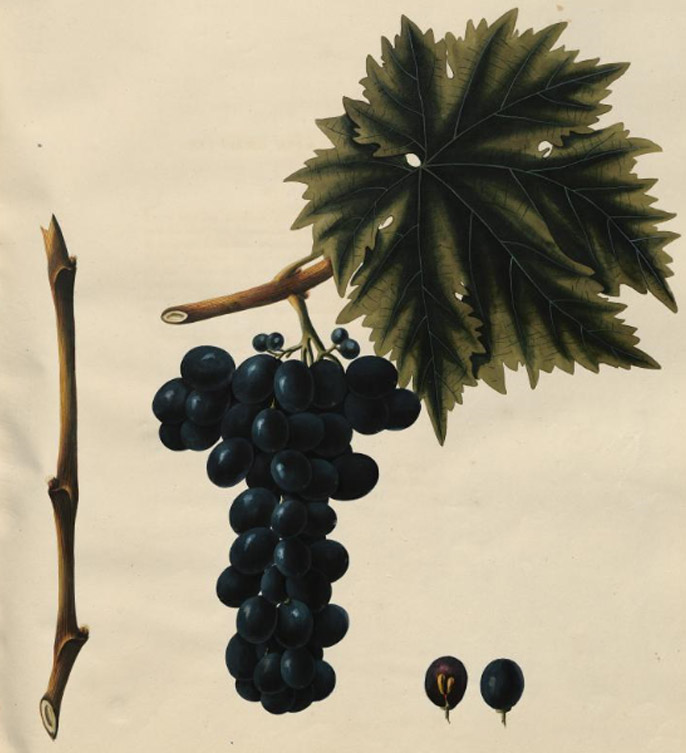 The red grape variety comes from the USA. Synonyms are Alexander's, Alexandria, Alexander Grape, Black Cape, Black Grape, Buck Grape, Cape Grape, Clifton's Constantia, Clifton's Lombardia, Columbian, Constantia, Farker's Grape, Madeira of York, Rothrock, Rothrock of Prince, Schuylkill, Schuylkill Madeira, Schuylkill Muscadel, Schuylkill Muscadine, Springmill Constantia, Tasker's Grape, Vevay, Vevay Winne, Winne, Winne Grape, Wiune and York Lisbon It must not be confused with the name-like new breed Alexander Winter. It is a probably natural cross between species of a wild Vitis labrusca x an unknown Vitis vinifera. The picture was taken by the botanist Johann S. Kerner (1755-1830) from his catalogue of grape varieties used in Germany at that time.
The red grape variety comes from the USA. Synonyms are Alexander's, Alexandria, Alexander Grape, Black Cape, Black Grape, Buck Grape, Cape Grape, Clifton's Constantia, Clifton's Lombardia, Columbian, Constantia, Farker's Grape, Madeira of York, Rothrock, Rothrock of Prince, Schuylkill, Schuylkill Madeira, Schuylkill Muscadel, Schuylkill Muscadine, Springmill Constantia, Tasker's Grape, Vevay, Vevay Winne, Winne, Winne Grape, Wiune and York Lisbon It must not be confused with the name-like new breed Alexander Winter. It is a probably natural cross between species of a wild Vitis labrusca x an unknown Vitis vinifera. The picture was taken by the botanist Johann S. Kerner (1755-1830) from his catalogue of grape varieties used in Germany at that time.
Initially the variety became known after the river as Schuylkill Muscadel and similar names. A few years before the American Revolution, it was cultivated in the 1760s by a Colonel Benjamin Tasker and cultivated on a large scale as Tasker's Grape in what is now the US state of Maryland. The name Clifton's Constantia in turn goes back to a William Clifton who claims to have found it in his garden in Southwark, Philadelphia. The late-maturing hybrid was discovered, selected, propagated and cultivated around 1740 on the banks of the Schuylkill River near the town of Springettsbury, northwest of Philadelphia in what is now the state of Pennsylvania, by a James Alexander. This man was the gardener of the Governor of Pennsylvania Thomas Penn (1702-1775), a son of the famous Quaker leader William Penn (1644-1718), after whom the US state is named. The site was close to a vineyard planted with European vines, which had been planted for William Penn in the 1680s and from which one of his parents probably came.
The US wine pioneer Jean Jacques Dufour (1763-1827) planted them in Kentucky in 1799 and called them Cape Grape, because he wrongly assumed that they came from the Cape of Good Hope in South Africa. The third US president Thomas Jefferson (1743-1826), included it in his experiments at his Monticello estate in Virginia from 1809 onwards and even described the wine with the typical foxtone as burgundy like. The Alexander variety was subsequently widespread in the south of the USA, but was then supplanted by the Catawba and finally fell into oblivion. In August 2000, it was replanted in the Jefferson Vineyards (Virginia) as part of a historic reproduction program and thus revived. In 2016, however, no stocks were recorded (Statistics Kym Anderson).
Voices of our members

As honorary chairman of the Domäne Wachau, it is the easiest and quickest way for me to access the wein.plus encyclopaedia when I have questions. The certainty of receiving well-founded and up-to-date information here makes it an indispensable guide.
Hans-Georg Schwarz
Ehrenobmann der Domäne Wachau (Wachau)